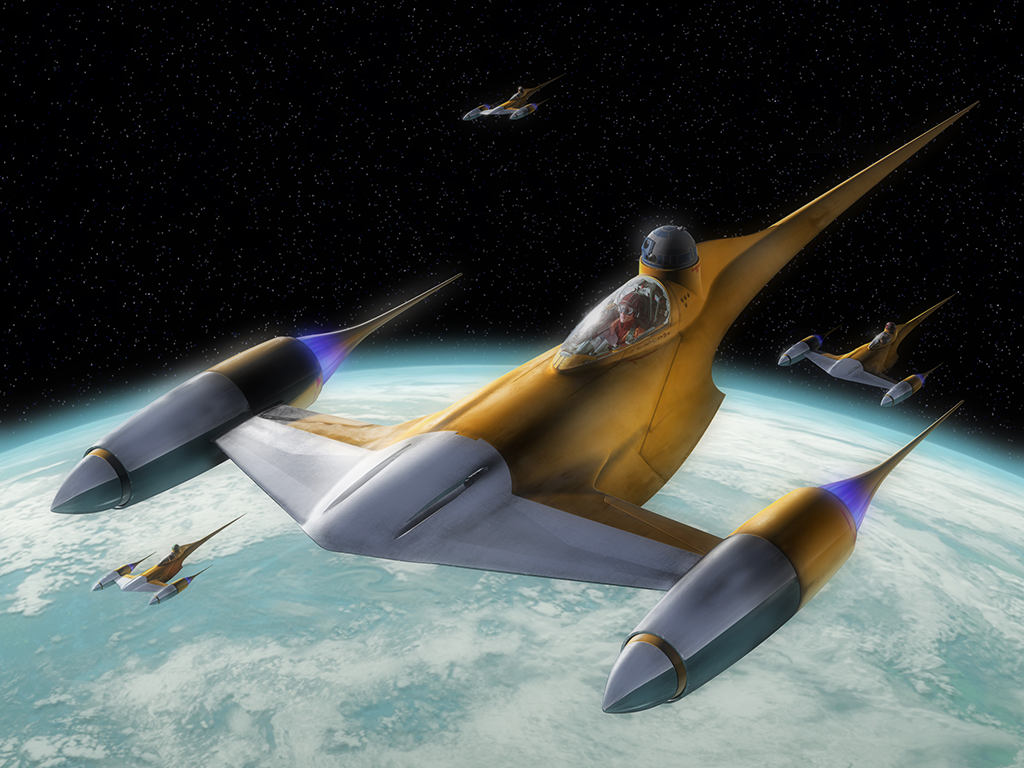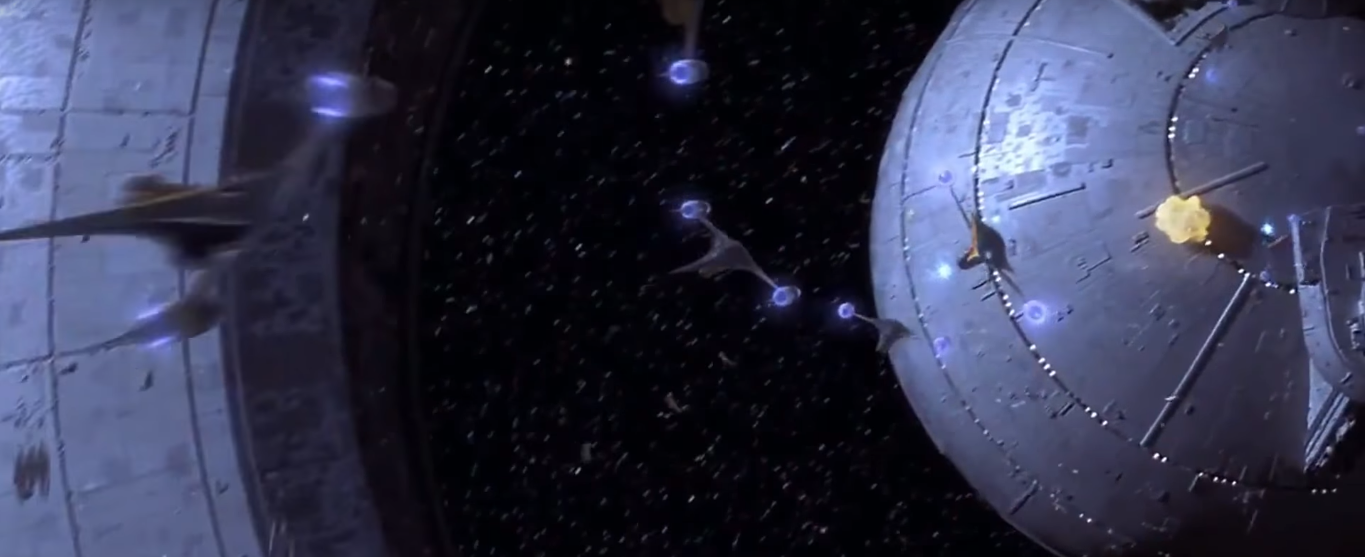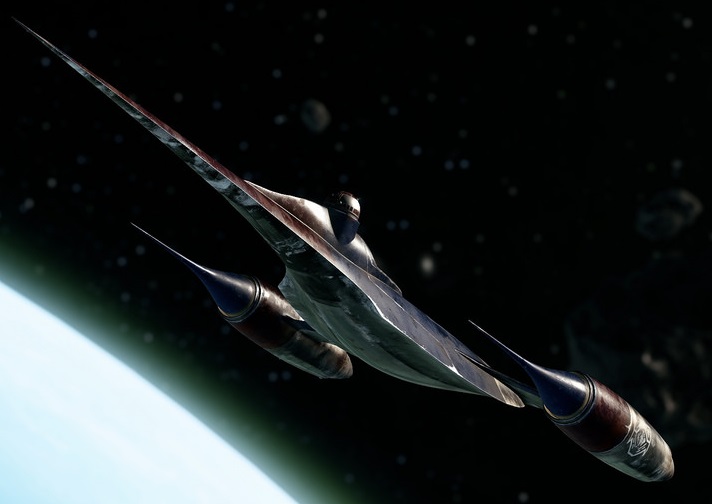The N-1 starfighter, also referred to as the Royal Naboo N-1 starfighter, Naboo N-1 starfighter, Naboo starfighter, N-1 fighter, or more simply, the N-1, was a single seat patrol craft developed by the Theed Palace Space Vessel Engineering Corps and used by the Royal Naboo Security Forces.

The N1 starfighter was a nimble craft.
The N-1 starfighter, was a sleek single-pilot craft used by the Naboo and demonstrated the marriage of art and function present in Naboo technology. Buffed chromium finishes on the craft's forward surfaces glinted in the sun for fly-bys and parades, and represented the royalty of Naboo, complementing the Royal Starship. The N-1's chromium stood in stark contrast to its overall yellow finish.
The craft carried two J-type engines, which rendered the starfighter an agile craft, and a Nubian Monarc C-4 hyperdrive engine, and had a single on-board astromech droid which was mounted on the top of the craft. It featured an autopilot system and shielding, along with offensive weaponry that consisted of two blaster cannons and integrated proton torpedo launchers, with one double proton torpedo magazine, that could carry ten proton torpedoes. It could attain a maximum speed of 1,100 kph and was eleven meters in length. The ship's central rat-tail acted as a power charger collector, and received energy from onboard generators when it was not in use. The ships two outer finials served as heat sinks for the engines.

N-1s attack the Trade Federation's Lucrehulk-class droid control ship at the Battle of Naboo
In use since at least the days of the High Republic Era, the N-1 starfighter was originally built by the Naboo, and was most notably used during the Trade Federation invasion of the planet. During the invasion, the pilots of Bravo Squadron flew the N-1 during the final assault against the Droid Control Ship Vuutun Palaa. Young Anakin Skywalker fired a pair of torpedoes into its starboard main reactor, effectively destroying it from within. They later joined in the celebration on the planet below, flying overhead Naboo's capital of Theed.
A decade later, three N-1s were used to escort Senator Padmé Amidala to Coruscant in order to vote on the Military Creation Act. Their Royal Starship held a decoy senator, and Amidala flew in one of the starfighters. They landed without incident, but the bounty hunter Zam Wesell hit the ship shortly after, destroying it and killing the senator's double; one of the three N-1s was also knocked off the landing platform by flying debris. N-1s remained in Naboo service during the Clone Wars, with several being kept in Theed Hangar during this time. During the war, Jedi Padawan Ahsoka Tano trained Amidala in starfighter combat, with Amidala flying an all-chrome N-1.

Din Djarin's highly modified N-1 starfighter.
Years later, following the climactic Battle of Endor, N-1 starfighters flew in celebration after the Galactic Empire's second Death Star was destroyed. Shortly thereafter, Imperial agents received posthumous orders from Emperor Palpatine to commence the destruction of Naboo via weather manipulation as part of Operation: Cinder. Rebel leader Leia Organa, ace pilot Shara Bey, and Naboo's own Queen Soruna flew three long-abandoned N-1 fighters in the Theed Hangar into space to destroy the Imperial satellites that were causing the extreme weather conditions.
The Mandalorian bounty hunter Din Djarin acquired a modified N-1 starfighter following the destruction of his previous starship, the Razor Crest. Djarin and the engineer Peli Motto constructed the ship at Hangar 3-5 in Mos Eisley, Tatooine.

Leema Kai's N-1 Starfighter
By the time of the Cold War, an N-1 starfighter was in the service of Jinata Security officer Leema Kai, and was modified with seismic charges in place of proton torpedoes. It was destroyed in a dogfight with Iden Versio.
In 35 ABY, N-1 starfighters were part of a fleet assembled by Lando Calrissian to assist the Resistance during the battle against the Sith Eternal forces over the planet Exegol.
The N-1 starfighter first appeared in the 1999 film Star Wars: Episode I The Phantom Menace, the first installment of the Star Wars prequel trilogy. A few practical models of the ship were built for the prequel trilogy. N-1 starfighters were later added to Star Wars: Episode VI Return of the Jedi as part of the celebration on Naboo in the ending montage in the DVD release.
The N-1 starfighter was designed by artist Doug Chiang, and it was one of his favorite designs. At the start of the design phase, the ship had the angular design aesthetic prevalent in the original trilogy. However, Chiang decided that Naboo's ships should have an aquatic feel because Naboo had a lot of water. Chiang thought that the ship would land on water, so he designed the ship to have a boat-like hull bottom and not have landing pads. He loved the idea of a really sleek boat form. Chiang knew that George Lucas loved F1 cars and F1 boats, and he found the F1 cars' lines to be striking. Chiang decided to turn the look of an F1 boat into a ship, which started the evolution of the ships's design.
Chiang knew that the ship would need to be functionally practical and also have the elegant flavor that Lucas wanted. In the design, Chiang turned the F1 boats' two pontoons into jet engines. Chiang designed the engines with a really long spike to mirror a fish's tail spike in order to give the ship a fishlike quality. Chiang massaged all of the details to fully complete the ship.
Chiang wasn't sure that the ship would make it into The Phantom Menace because it had a risky design. The ship ultimately made it into the film because it was iconic, simple to read, fresh, and the audience could tell what it was. Lucas liked the design and wanted to go further by giving the ship a bold color.
During production of The Phantom Menace, Visual Effects Supervisor John Knoll and the film's crew ran into a problem because the N-1 starfighters' tails went through the walls of the Theed hangar in order to fit into their stalls. During production of the Star Wars: The Clone Wars episode "Blue Shadow Virus," the show's crew dealt with the same problem. Supervising director Dave Filoni consulted with Knoll, who confirmed they also had this problem while working on The Phantom Menace.
The full-size N-1 Starfighter prop used by Anakin Skywalker in Star Wars: Episode I The Phantom Menace, was on display in Boston's Museum of Science as part of the Star Wars: Where Science Meets Imagination exhibit in 2005, and remained on display in the museum's Blue Wing for several years afterward, hanging above guest's heads with several large wires. It was ultimately taken down several years later, having accumulated large amounts of dust in the process.
- Star Wars: Galaxy of Heroes
- LEGO Star Wars: The Freemaker Adventures — "Zander's Joyride"
- LEGO Star Wars: The Freemaker Adventures — "The Test"
- LEGO Star Wars: The Freemaker Adventures — "The Kyber Saber Crystal Chase"
- LEGO Star Wars: The Freemaker Adventures — "The Tower of Alistan Nor"
- LEGO Star Wars: Droid Tales — "Exit from Endor"
- LEGO STAR WARS: Celebrate the Season — "Gifting With Grogu"
- LEGO STAR WARS: Celebrate the Season — "Mandoween"
- LEGO Star Wars: The Force Awakens
- LEGO Star Wars: The Skywalker Saga